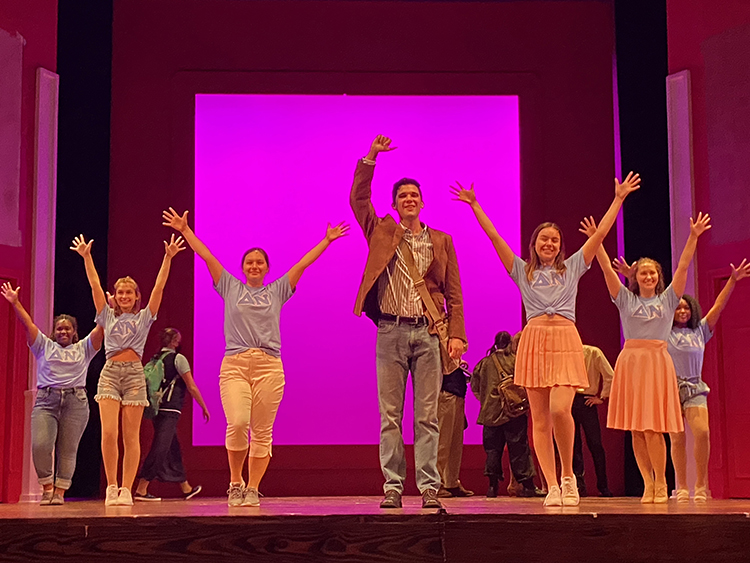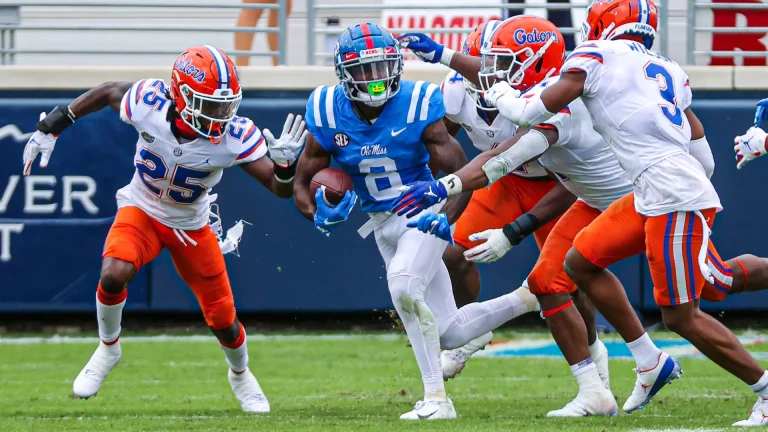
University of Mississippi students (from left) Morgan Yhap, Samantha Turner, Reese Overstreet, Parker Viator, Emily Arthur, Myah Harper and Ashley Wingo sing and dance during rehearsal of a scene from 'Legally Blonde: The Musical.' The production of the UM Department of Theatre and Film opens Friday (Oct. 29) at the Gertrude C. Ford Center for the Performing Arts. Photo by LilaGrace Lara
After more than 18 months away from auditorium stages, the University of Mississippi Department of Theatre and Film is returning, unleashing all that pent-up energy with a spectacular production big enough to fill the Gertrude C. Ford Center for the Performing Arts.
“Legally Blonde: The Musical” opens Friday (October 29) at the Ford Center and runs through Sunday (October 31), with performances at 7:30 pm Friday, 2 pm and 7:30 pm Saturday, and 2 pm Sunday. The Saturday matinee performance will feature ASL interpretation and live captioning.
Tickets are $20 each and can be purchased through the Ole Miss Box Office at the Ford Center. Call 662-915-7411 or click here to order.
According to director Rory Ledbetter, “Legally Blonde” is exactly the kind of show people need now.
“I think this is a great show to bring live performance back to the stage in a big way,” Ledbetter said. “It’s a celebration of life, and it’s fun. I imagine it’s going to be really inspiring for a lot of people.”
The story, based on the 2004 movie “Legally Blonde,” starring Reese Witherspoon, follows Elle Woods, a recent college graduate who expects to wed her college sweetheart but learns in the opening number that he has different plans: He’s going to law school. Across the country. Without Elle.
Never one to let a little thing like a breakup, or a continent, or the LSAT – for which her degree in fashion merchandising has not prepared her – stand in her way, Elle decides to follow her ex to Harvard. After she charms and cheers her way through admissions, Elle discovers – as much to her own surprise as to everyone else’s – that she has a knack for lawyering. All she needed was to believe in herself.
“This is about ‘To thine own self be true,’ which is a Shakespeare quote at the end, and it’s about Elle really learning how to embrace who she is,” Ledbetter said.
Ledbetter, an associate professor of voice and acting, directed the department’s last live, in-theater production, “Boeing Boeing,” in February 2020.
The design process began last spring, which is a good thing because this is a large show with a large cast performing on the university’s largest stage, in the Ford Center main hall. The department does one major production there every other year; the last was “Little Women” in the fall of 2019.
Cody Stockstill, assistant professor of scenic design, conceived of the sets for the show, which he said has upwards of 25 different “locations” that need to be depicted.
“This is pretty common when you take a movie and make it into a play,” Stockstill explained. “In a movie, you can just cut to another location. So the challenge with musicals that have come from movies is you get all the locations that were in the movie and have to figure out how to put them on stage.”
Stockstill’s tactic was to boil everything down to its barest essence, so that smaller pieces of scenery can be moved around a fixed structure to “suggest each location that Elle visits or interacts with.”
Many of the smaller scenic elements will do double-duty in creating locations; Stockstill also said that projections play a major role in delivering additional information to the audience.
One piece of information that will be delivered consistently throughout the show is that the world on stage is Elle’s world, and we know this because it’s her favorite color: pink. Official Barbie pink, to be exact.
Yes, there is such a thing, and Stockstill found it, and custom-mixed paint to match and poured it over nearly every piece of the set. A special paint treatment combined with lighting techniques will give the set pieces a “plastic-like finish” – just like a Barbie Dream House.
“This show is about Elle; she’s the anchor of the show,” he said. “We took the concept that this is her world and she’s meeting challenges within her role. We’re playing around with color in how we present that.”
Stockstill explained that Elle’s experiences and emotional states will be expressed through color: when she’s comfortable in her world, everything’s pink; when she has challenges or questions herself, contrasting colors come into play.
“That’s something an audience member might observe – that the colors sort of reflect her psychology in any given moment,” he said.
The psychology of Elle Woods has become something of a specialty to senior Erin Stanphill, a senior theatre arts major from Fulton, who plays the leading role in the production.
“I’ve been doing a lot of character work on Elle,” Stanphill said, “which includes her enneagram, her astrology sign,” and her Myers-Briggs personality type (ENFP, for those who follow such things), along with creating a Spotify playlist and Pinterest board of things that, to Stanphill’s mind, exemplify her character and help her inhabit Elle’s world.
“Elle is such an empowering woman,” Stanphill said. “She’s not afraid to speak her mind; she’s not afraid to show who she truly is.”
While getting into the role, Stanphill said she thought about what kind of lie Elle might have told herself since she was younger that would be the driving force behind her actions, and she decided that the lie is that she’s unlikable, and therefore has to be a certain way and meet certain expectations to prove her worth.
“But when she comes to terms with herself, she finds this new way of being, of loving yourself, and how much power comes from being OK with who you are,” Stanphill said. “I think self-love is a huge concept for this show.”
Stanphill has been preparing physically for the demanding role as well.
“This is one of the most athletic shows out there – running up stairs and singing and dancing all at the same time,” she explained. “I do 15 minutes on a Stairmaster every day with lip trills to keep up my endurance,” adding that she increases the tension level every five minutes because in musicals, a song tends to “start out kind of moderate and then builds and builds and builds and builds.”

One of the more demanding roles actually is offstage. Katherine Clark, a junior elementary education major from Southaven, is the stage manager, and she, along with assistant stage manager Sakura Marter, a freshman theatre arts major from Ocean Springs, is responsible for making sure people and props are where they’re supposed to be at all times.
“When someone asks me what a stage manager is, the easiest way is to start off by saying I’m basically the director’s secretary,” Clark said. This involves keeping up with rehearsals, taking copious notes and communicating among the cast and crew.
But once tech starts – the week before opening night when all the technical elements are incorporated into rehearsals so that problems can be identified and addressed before the actual performance – the stage manager’s role changes to calling cues that tell the crew when to do certain things.
“You’re over the show in place of the director now, so it’s kind of like a role where you do everything, and you’re in a leadership position but you’re not the director,” Clark said. “Really, it’s my job to make sure the show goes on.”
Clark got into stage management in high school and it has remained her favorite part of theater; she hopes to incorporate theater into her teaching and is taking theater classes at Ole Miss as part of a fine arts concentration within her major.
Even as a nonmajor, Clark said she found it easy to get involved with the department, having come by during orientation to talk about opportunities. She eventually managed a show for student-run Ghostlight Repertory Theatre and then served as assistant stage manager on the department’s 2019 production of “The Wolves.”
“Everyone was super friendly and wanted me here even though I wasn’t a major, which made everything easier,” she said. “It’s a pretty welcoming department that’s like a big family.”
Clark said her favorite thing about “Legally Blonde” is “just being able to be with everybody again, especially after the year we’ve had.”
Ledbetter echoed that sentiment.
“We’ve tried to connect, but we haven’t had a lot of face-to-face interactions, or without using an electronic medium,” Ledbetter said.
“This idea of coming out more into a collective community, letting it be a celebration of joy is, I think is going to be very life-affirming, community-affirming, and human-affirming. It’s what everyone is craving.”
By Katherine Stewart









